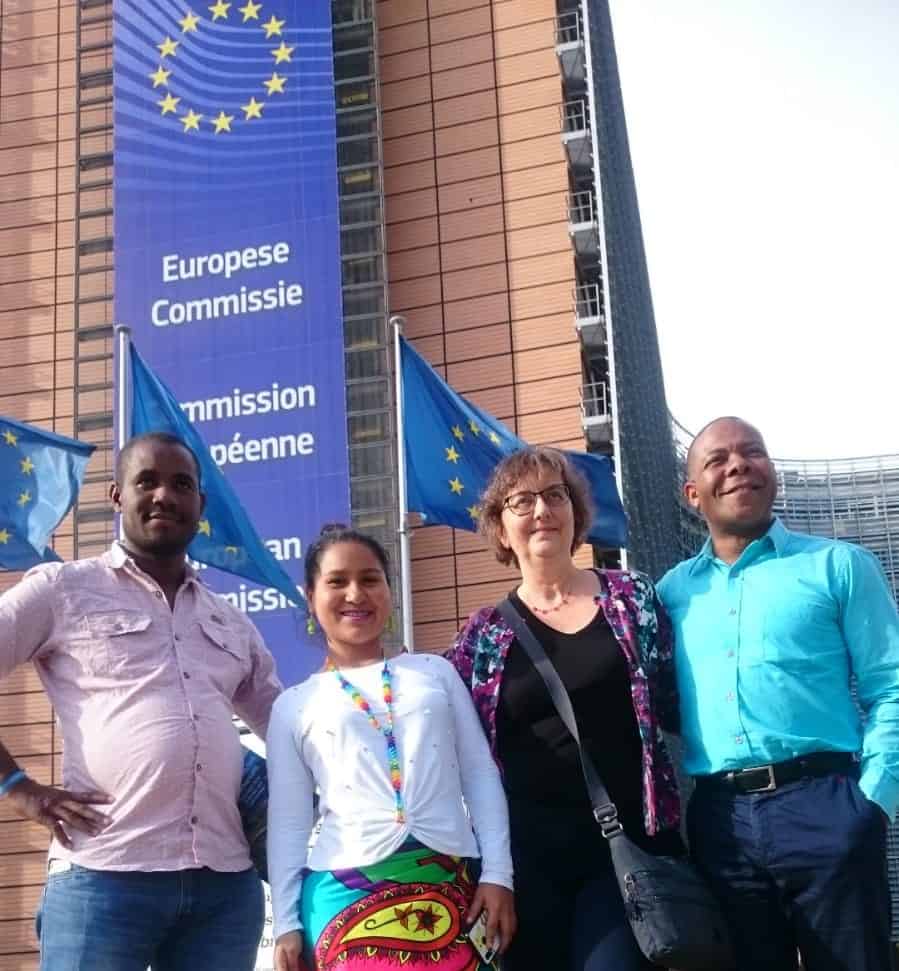In November 2019 two Guardians of the River Atrato together with the a representative of the Dioceses of Quibdo, Choco, Colombia visited Brussels and spoke to members of the European Parliament. As a result of the information they shared about the situation in Colombia Jude Kirton Darling, British MEP and Maria Arenas, Spanish MEP wrote to the EU Trade and Development Committee making a complaint under the sustainability clause in the EU-Andean Free Trade Agreement.

Letter from Jude Kirton-Darling MEP and Marie Arena MEP
The Free Trade Agreement between the European Union, Colombia, Peru and Ecuador has been presented by the European Commission as an opportunity for the Andean Countries to diversify their economies, promote sustainable development, respect for human rights and guarantee civil society participation. Title IX of the Agreement: Commercial and Sustainable Development states that these objectives must be guaranteed through effective implementation of binding International Conventions contained in the Agreement in respect to fundamental human, labour and environmental rights.
In environmental matters, the Commercial Agreement must be implemented in line with the agreements signed by Colombia, such as: The Convention on Biological Diversity (CBD) 1; the Convention on International Trade in Endangered Species of Wild Fauna and Flora2; the Kyoto protocol of the United Nations Framework Convention on Climate Change3, amongst others. In the case of the CBD, the Colombian State must ensure the biological conservation of its ecosystems, as well as, sustainable, fair and equitable use.4 In spite of this we are seeing a humanitarian and environmental crisis in the department of Chocó, north-eastern Colombia.5
The Choco Biogeographic region is one of the richest biodiversity ecosystems on the planet.6 The majority of the inhabitants are indigenous and afro-Colombian Peoples, who suffer from the department having one of the highest rates of multidimensional poverty in Colombia.7 The internal armed conflict, territorial control by legal and illegal armed actors, the impact of extractive activities and coca cultivation have resulted in violations and abuses of International Humanitarian and Human Rights Law. Confinement and forced displacement of communities continues despite Early Warning Alerts from the Human Rights Ombudsman (Defensoría).8
This grave humanitarian and environmental crisis, led local communities to take a citizen’s action (Tutela) to the Constitutional Court. They won a landmark ruling T-622 of 20169. In this historic ruling, the Court recognised the environmental degradation of the River Atrato, its tributaries and ecosystems especially by deforestation, and illegal mining activities which were contaminating its water sources with toxic substances including mercury and cyanide. Along with, violations of the riverine communities to the right to health, water, food and food soveriegnty, security, the right to a healthy environment, to physical and cultural suvival, cultural and territorial rights, including free prior and informed Consent (ILO 169).10 The Court ordered that as the State had failed to fulfill its constitutional obligations it must remedy them, jointly with the communities, by implementing an action plan, which includes the management of the territory by state agencies together with 14 members of ethnic communities, referred to as the “Guardians of the Atrato”.
We call the attention of the European Commission and its Trade Department to the situation of human and environmental rights in Chocó, which in our judgement is a violation of environmental agreements under the Trade Agreement and the commitments to ensure conversations regarding biodiversity, the protection of species of flora and fauna, and guarantee human rights in Colombia. Therefore, we call for you to use your commercial lever to ensure compliance with these environmental commitments, which also, exceed the Commercial Agreement and are of interest to all humanity, as is the biological conversation of large ecosystems as a guarantee in the struggle against climate change.
Climate change is a priority for the EU and its member states, as demonstrated by the Paris Agreement, the commitment of the European Commission and Council to the Green Deal11, and the Council President, Finland, who has as a central precept of its agenda to position the EU as a global leader on climate change actions12.
Additionally, compliance with the judgment empowers communities that protect the environment, recognising them as a local partner for the protection of, and the sustainable management of, natural resources and protection of ecosystems in Colombia. Acknowledging the role of communities in the management and sustainable protection of their territories, legitimises the environmental defenders in one of the countries with the greatest violence against defenders, especially against those who defend the environment and the territory.
